- Mandingo (1975)
- A Streetcar Named Desire (1951)
- The Heart Is a Lonely Hunter (1968)
- Sling Blade (1996)
- Roots (1977)
- Deliverance (1972)
- The Color Purple (1985)
- Easy Rider (1969)
- In the Heat of the Night (1967)
- This Property Is Condemned (1966)
- Macon County Line (1974)
- Payday (1973)
- Jason's Lyric (1994)
- The Beguiled (1971)
- Southern Comfort (1981)
- Murder in Coweta County (1983)
- The Apostle (1997)
- The Lords of Discipline (1983)
- Rosewood (1997)
- I Am a Fugitive from a Chain Gang (1932)
- Mississippi Burning (1988)
- Dead Man Walking (1995)
- Go Tell It on the Mountain (1985)
- Blue Velvet (1986)
- The Texas Chain Saw Massacre (1974)
 Mandingo is extremely raw and honest when it comes to slavery in the United States during the 19th
century, making Roots look like a puppy. On why he took on the project, director Richard Fleischer said,
"The whole slavery story has been lied about, covered up, and romanticized so much I thought it really had to
stop...the only way to stop was to be brutal as I could possibly be."
Mandingo is extremely raw and honest when it comes to slavery in the United States during the 19th
century, making Roots look like a puppy. On why he took on the project, director Richard Fleischer said,
"The whole slavery story has been lied about, covered up, and romanticized so much I thought it really had to
stop...the only way to stop was to be brutal as I could possibly be."
 The most New Orleans movie ever made, A Streetcar Named Desire is the one that catapulted Marlon Brando
to superstardom. Take a delicate, pretty flower. It's all about "oh, darling," "precious things," and the likes.
Now, enter an animal with greasy paws who tears it all up and smashes everything into pieces. That's precisely
what happened between Vivien Leigh and Marlon Brando in a fast, furious film that would change acting forever.
The most New Orleans movie ever made, A Streetcar Named Desire is the one that catapulted Marlon Brando
to superstardom. Take a delicate, pretty flower. It's all about "oh, darling," "precious things," and the likes.
Now, enter an animal with greasy paws who tears it all up and smashes everything into pieces. That's precisely
what happened between Vivien Leigh and Marlon Brando in a fast, furious film that would change acting forever.
 Brace yourself because The Heart Is a Lonely Hunter is truly a depressing movie and is as Southern Gothic
as it gets. The ending which shows the lead character dealing with the news of his friend is both shocking and
powerful. Alan Arkin and Sondra Locke are unforgettable, earning themselves Oscar nominations.
Brace yourself because The Heart Is a Lonely Hunter is truly a depressing movie and is as Southern Gothic
as it gets. The ending which shows the lead character dealing with the news of his friend is both shocking and
powerful. Alan Arkin and Sondra Locke are unforgettable, earning themselves Oscar nominations.
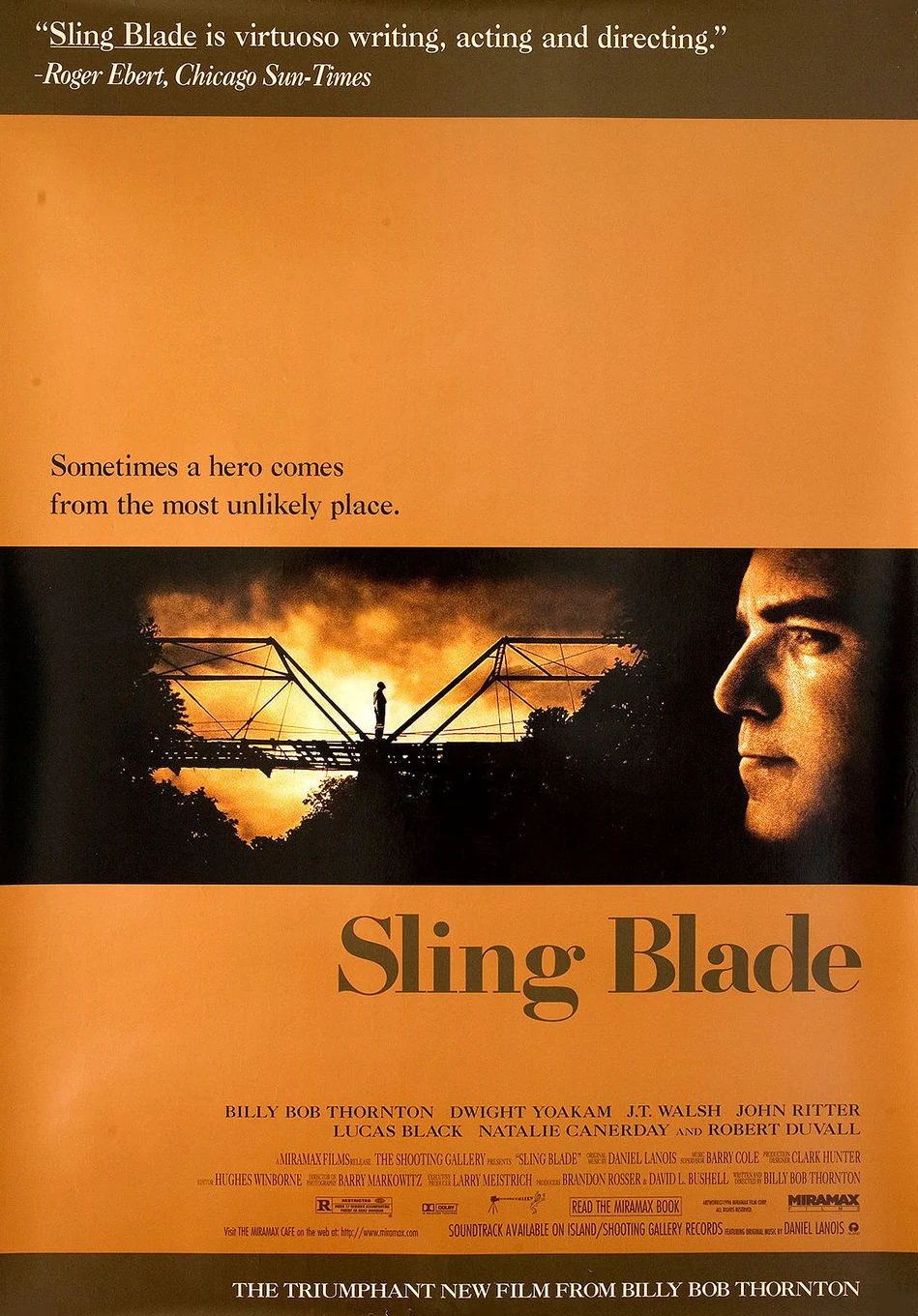 Showing a mix of dumb and (more of) intelligence, Karl Childers will live forever as one of the great icons in
Southern Gothic cinema. It's hard to forget the six-minute scene when he tells his life story. That has to be
one of the finest ways to introduce a character. If there's only one film in Billy Bob Thornton's oeuvre to
choose from, you must make it Sling Blade.
Showing a mix of dumb and (more of) intelligence, Karl Childers will live forever as one of the great icons in
Southern Gothic cinema. It's hard to forget the six-minute scene when he tells his life story. That has to be
one of the finest ways to introduce a character. If there's only one film in Billy Bob Thornton's oeuvre to
choose from, you must make it Sling Blade.
 For ten hours, Roots is a powerful moving story about the lives of black slaves and white slaveholders
on plantations that are run by white overseers for over 120 years. There are many ups and (mostly) downs
throughout the ordeal. No dramatic acts of heroism are undertaken, but rather, there are many scenes of black
slaves laying their heads down and taking the abuse.
For ten hours, Roots is a powerful moving story about the lives of black slaves and white slaveholders
on plantations that are run by white overseers for over 120 years. There are many ups and (mostly) downs
throughout the ordeal. No dramatic acts of heroism are undertaken, but rather, there are many scenes of black
slaves laying their heads down and taking the abuse.
 "What did happen on the Cahulawassee River?" And the answer to that question is: a lot of bad shit. It's
impossible to separate Deliverance from banjo music, the Appalachian Mountains, whitewater rafting, the
sound of a squealing pig, and hillbillies. Why...there's a shirt that says: "Paddle faster! I hear banjo
music." Burt Reynolds and Billy Redden are unforgettable.
"What did happen on the Cahulawassee River?" And the answer to that question is: a lot of bad shit. It's
impossible to separate Deliverance from banjo music, the Appalachian Mountains, whitewater rafting, the
sound of a squealing pig, and hillbillies. Why...there's a shirt that says: "Paddle faster! I hear banjo
music." Burt Reynolds and Billy Redden are unforgettable.
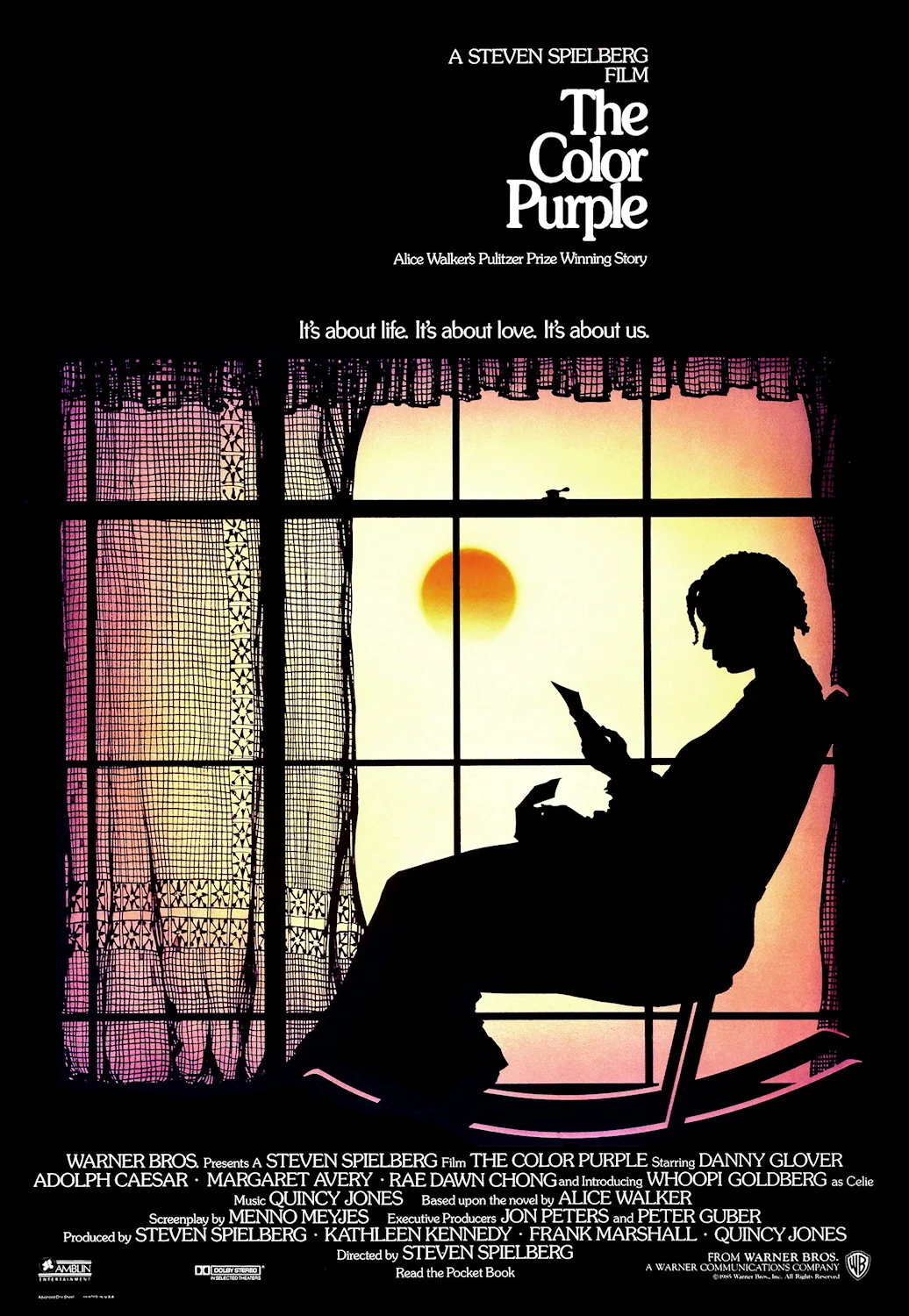 A landmark in black cinema, The Color Purple captures the human spirit so well that it's a strange
yet moving work of art with powerful scenes. Making her astonishing film debut is Whoopi Goldberg. There's so
much for the characters to overcome such as domestic violence, incest, forced separation, rape, slavery,
pedophilia, poverty, racism, and sexism.
A landmark in black cinema, The Color Purple captures the human spirit so well that it's a strange
yet moving work of art with powerful scenes. Making her astonishing film debut is Whoopi Goldberg. There's so
much for the characters to overcome such as domestic violence, incest, forced separation, rape, slavery,
pedophilia, poverty, racism, and sexism.
 "An astonishing work of art and an overpowering motion picture experience" is how one Los Angeles Times
critic described Easy Rider. Dennis Hopper, Peter Fonda, and Jack Nicholson will always be identified
with this film. Entering the Deep South, the tragic ending is memorable because of what George Hanson said:
"They're scared of what you represent to 'em. What you represent to them is freedom."
"An astonishing work of art and an overpowering motion picture experience" is how one Los Angeles Times
critic described Easy Rider. Dennis Hopper, Peter Fonda, and Jack Nicholson will always be identified
with this film. Entering the Deep South, the tragic ending is memorable because of what George Hanson said:
"They're scared of what you represent to 'em. What you represent to them is freedom."
 Two acting powerhouses come clashing each other in In the Heat of the Night: Sidney Poitier and Rod
Steiger. As Virgil Tibbs, Sidney Poitier is magical and has two iconic scenes: "They call me MISTER Tibbs!"
and when he slapped Mr. Endicott back. Of the latter, you could hear a pin drop in the middle of the Deep South.
Two acting powerhouses come clashing each other in In the Heat of the Night: Sidney Poitier and Rod
Steiger. As Virgil Tibbs, Sidney Poitier is magical and has two iconic scenes: "They call me MISTER Tibbs!"
and when he slapped Mr. Endicott back. Of the latter, you could hear a pin drop in the middle of the Deep South.
 As Southern Gothic as the film gets that's based on Tennessee Williams' play, it's the beautiful Natalie Wood,
draped in Edith Head's wonderful costumes, who runs away with the show by giving the best performance of her
career. Reminding me of Blanche DuBois and Scarlett O'Hara but more toward the former, her character lives
in a fantasy world and sees only the positive things.
As Southern Gothic as the film gets that's based on Tennessee Williams' play, it's the beautiful Natalie Wood,
draped in Edith Head's wonderful costumes, who runs away with the show by giving the best performance of her
career. Reminding me of Blanche DuBois and Scarlett O'Hara but more toward the former, her character lives
in a fantasy world and sees only the positive things.
 Macon County Line is the kind of picture that takes its time with the atmospheric setting and mood,
and once the climax hits, the film just explodes in the final twenty minutes that makes it unforgettable.
Helped by the characters, the Southern Gothic style comes alive which works to its advantage.
Macon County Line is the kind of picture that takes its time with the atmospheric setting and mood,
and once the climax hits, the film just explodes in the final twenty minutes that makes it unforgettable.
Helped by the characters, the Southern Gothic style comes alive which works to its advantage.
 Shot on location in Selma, Alabama, Payday may have a slow start, but it gets better over time.
A lot of it is reminiscent of Five Easy Pieces, and Rip Torn, who's famous as Artie
from The Larry Sanders Show, is certainly the poor man's Jack Nicholson. Simply put, it's a brilliant film
of character study. Everybody is deeply sketched, and the performances are impeccable.
Shot on location in Selma, Alabama, Payday may have a slow start, but it gets better over time.
A lot of it is reminiscent of Five Easy Pieces, and Rip Torn, who's famous as Artie
from The Larry Sanders Show, is certainly the poor man's Jack Nicholson. Simply put, it's a brilliant film
of character study. Everybody is deeply sketched, and the performances are impeccable.
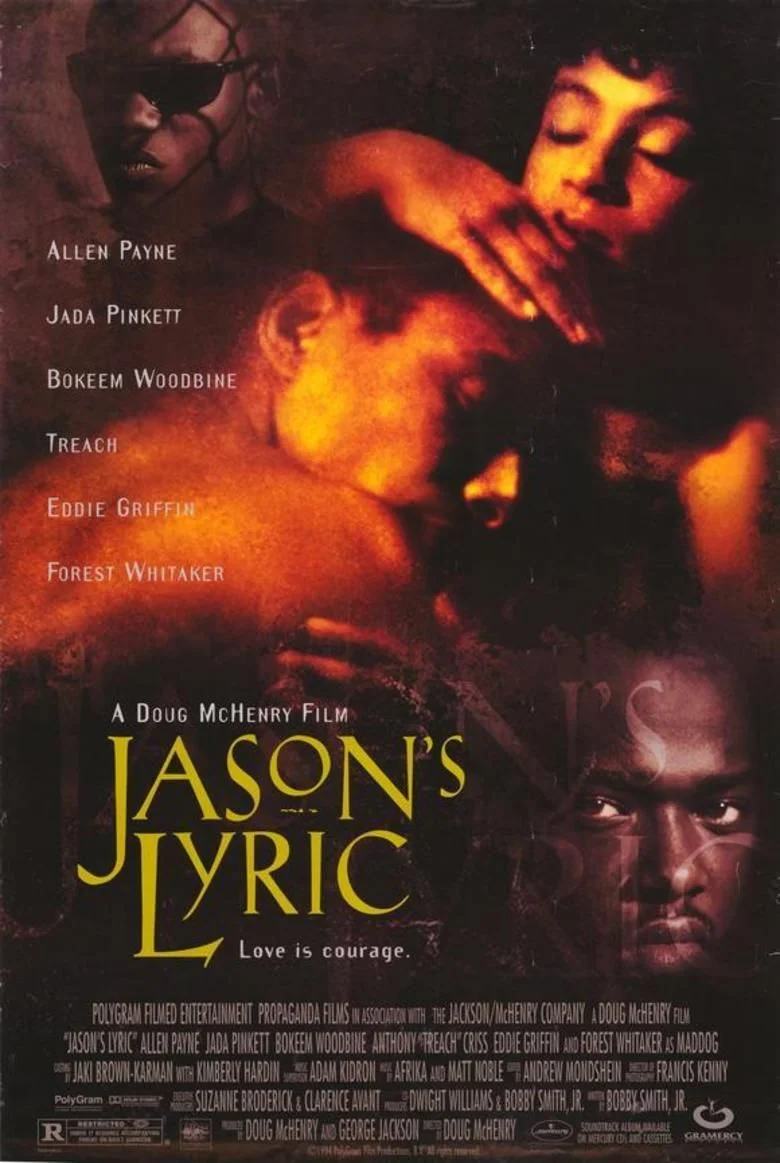 Shot on location in Houston, Texas, Jason's Lyric is a unique, powerful Southern Gothic picture with
strong performances. The love story may be ordinary, but it's sexually charged and gets better as time goes
on because of the compelling thread between two brothers which leads to a shocking ending. Not to miss is
the wonderful acting job by Bokeem Woodbine.
Shot on location in Houston, Texas, Jason's Lyric is a unique, powerful Southern Gothic picture with
strong performances. The love story may be ordinary, but it's sexually charged and gets better as time goes
on because of the compelling thread between two brothers which leads to a shocking ending. Not to miss is
the wonderful acting job by Bokeem Woodbine.
 The Beguiled is a strange Civil War picture that's shot on location in Baton Rouge, Louisiana. The
tale starts out innocently enough. Midway, it descends to a pornographic love triangle with weird characters.
An ending is reached which results in a rare death of Clint Eastwood's character that's fitting for an Edgar
Allan Poe short story.
The Beguiled is a strange Civil War picture that's shot on location in Baton Rouge, Louisiana. The
tale starts out innocently enough. Midway, it descends to a pornographic love triangle with weird characters.
An ending is reached which results in a rare death of Clint Eastwood's character that's fitting for an Edgar
Allan Poe short story.
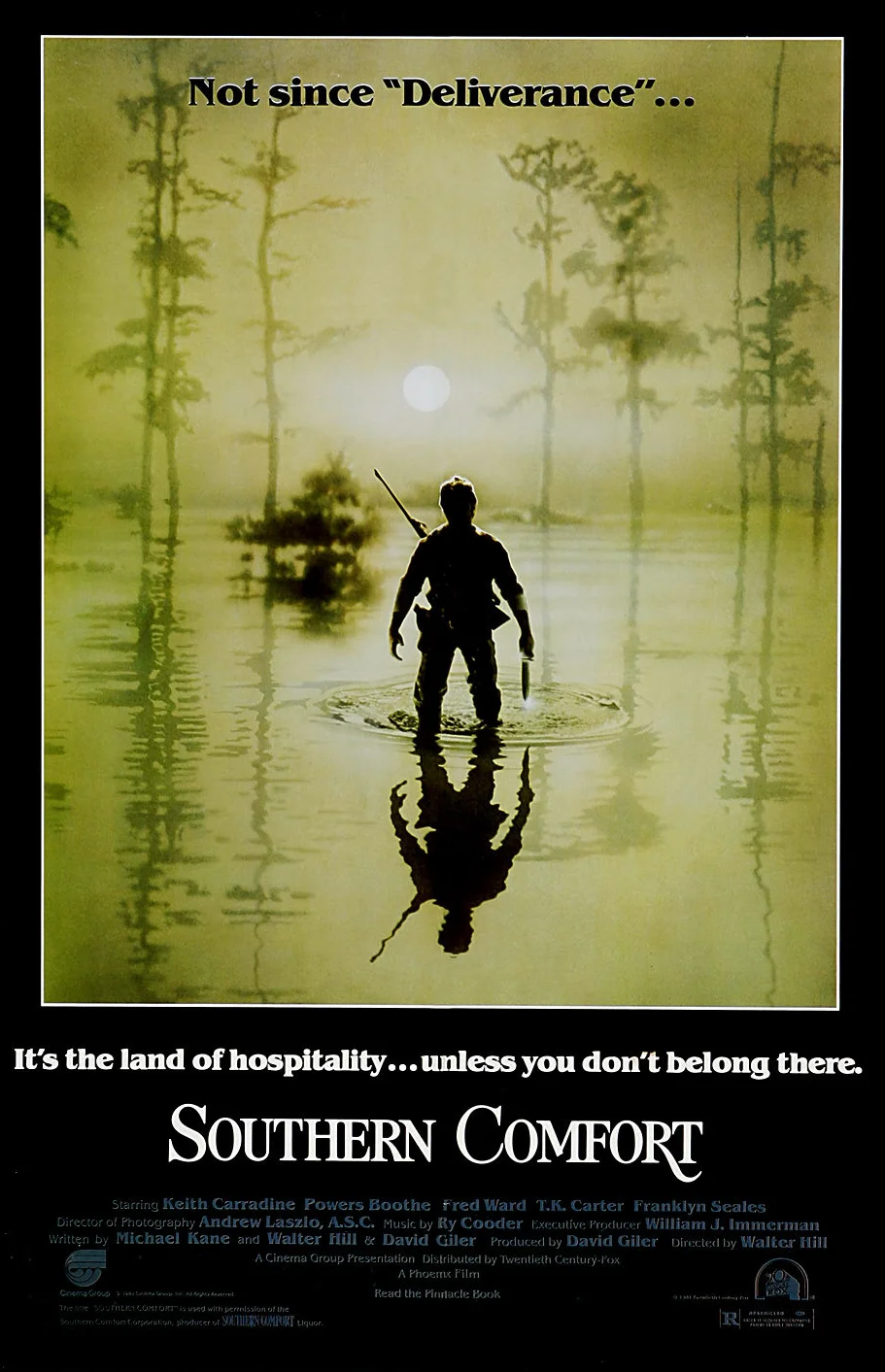 A metaphor for the mistakes made in the Vietnam War, Southern Comfort is a finely directed Kafka-esque
picture by Walter Hill. What a great cast. The performances are terrific with a bunch of memorable characters
and an unbelievable ending. Andrew Laszlo's cinematography of the Louisiana Bayou is the clincher to create
a Deliverance-like atmosphere.
A metaphor for the mistakes made in the Vietnam War, Southern Comfort is a finely directed Kafka-esque
picture by Walter Hill. What a great cast. The performances are terrific with a bunch of memorable characters
and an unbelievable ending. Andrew Laszlo's cinematography of the Louisiana Bayou is the clincher to create
a Deliverance-like atmosphere.
 Andy Griffith...Johnny Cash...two black men carrying a dead body that's wrapped in burlap blanket along the
pole...Murder in Coweta County. Spooky stuff. Based on the book by Margaret Anne Barnes, the film is
as Southern as it gets and pretty gothic at that, too. Solid police work makes for a straightforward case.
Andy Griffith...Johnny Cash...two black men carrying a dead body that's wrapped in burlap blanket along the
pole...Murder in Coweta County. Spooky stuff. Based on the book by Margaret Anne Barnes, the film is
as Southern as it gets and pretty gothic at that, too. Solid police work makes for a straightforward case.
 The Apostle paints a complex picture of a religion-obsessed criminal who uses the power of faith to move
human beings. A pure spiritual awakening with insights into the churchgoing culture in the Deep South, there
are many scenes that are moving. Robert Duvall is very sincere about it, and there's nothing overdone.
The Apostle paints a complex picture of a religion-obsessed criminal who uses the power of faith to move
human beings. A pure spiritual awakening with insights into the churchgoing culture in the Deep South, there
are many scenes that are moving. Robert Duvall is very sincere about it, and there's nothing overdone.
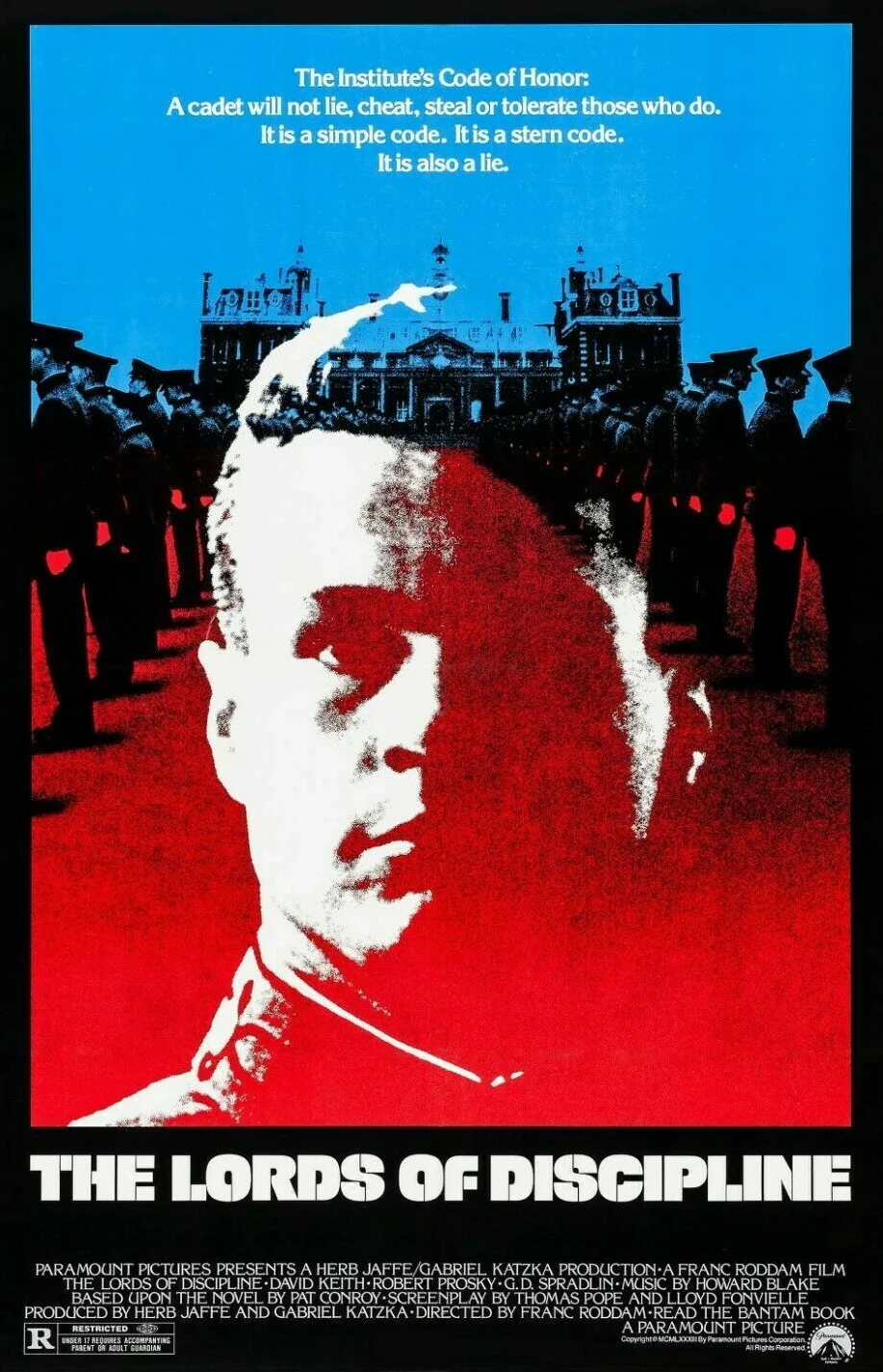 The best Pat Conroy film made, The Lords of Discipline is superior to Taps in every respect.
It's also realistic and has a lot to say about racism, backwards thinking, and misplaced male superiority. The
author attended The Citadel, and the story is based on his experiences and what he witnessed during four years
there.
The best Pat Conroy film made, The Lords of Discipline is superior to Taps in every respect.
It's also realistic and has a lot to say about racism, backwards thinking, and misplaced male superiority. The
author attended The Citadel, and the story is based on his experiences and what he witnessed during four years
there.
 Black residents were lynched. The state government of Florida knew about the incident but did nothing about it.
The town was never rebuilt, and no black residents talked about what happened until the 1980's, hence
Rosewood. Filled with great acting, it's a rare film about the dark history of racism that
existed in the United States for hundreds of years.
Black residents were lynched. The state government of Florida knew about the incident but did nothing about it.
The town was never rebuilt, and no black residents talked about what happened until the 1980's, hence
Rosewood. Filled with great acting, it's a rare film about the dark history of racism that
existed in the United States for hundreds of years.
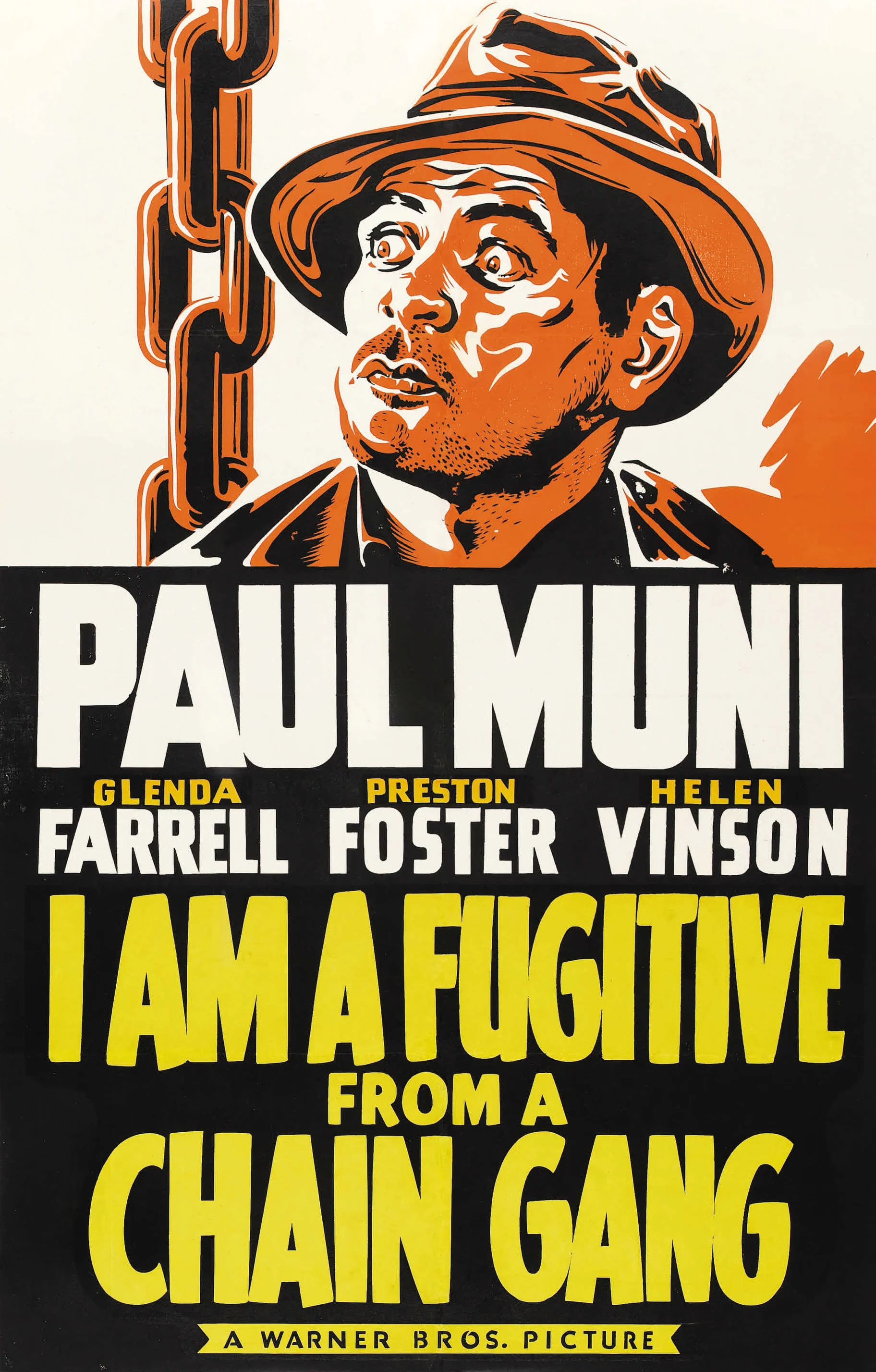 I Am a Fugitive from a Chain Gang is a heartfelt story about a decent man, down on his luck, who dreams
of being a civil engineer so he can build roads and bridges. The on-screen portrayal of the chain gang in the
Deep South was enough for the public to denounce the practice, and forever gone that was by 1955. Paul Muni's
performance is more than outstanding, and the haunting ending is timeless.
I Am a Fugitive from a Chain Gang is a heartfelt story about a decent man, down on his luck, who dreams
of being a civil engineer so he can build roads and bridges. The on-screen portrayal of the chain gang in the
Deep South was enough for the public to denounce the practice, and forever gone that was by 1955. Paul Muni's
performance is more than outstanding, and the haunting ending is timeless.
 If there's anything I've learned about the movie, it's this: Never visit Mississippi; don't stop, just drive
on. Most people agree Mississippi is one of the worst, if not the worst, states in the nation. It has the
highest unemployment rate, highest poverty rate, worst public education system, highest rate of obesity, and
lowest life expectancy and is the least safe state to live in.
If there's anything I've learned about the movie, it's this: Never visit Mississippi; don't stop, just drive
on. Most people agree Mississippi is one of the worst, if not the worst, states in the nation. It has the
highest unemployment rate, highest poverty rate, worst public education system, highest rate of obesity, and
lowest life expectancy and is the least safe state to live in.
 Dead Man Walking isn't about changing people's minds about capital punishment but rather offers a
realistic yet neutral insight into how the death sentence is carried out at the Louisiana State Penitentiary.
There are many powerful scenes with exceptional performances by Sean Penn and Susan Sarandon.
Dead Man Walking isn't about changing people's minds about capital punishment but rather offers a
realistic yet neutral insight into how the death sentence is carried out at the Louisiana State Penitentiary.
There are many powerful scenes with exceptional performances by Sean Penn and Susan Sarandon.
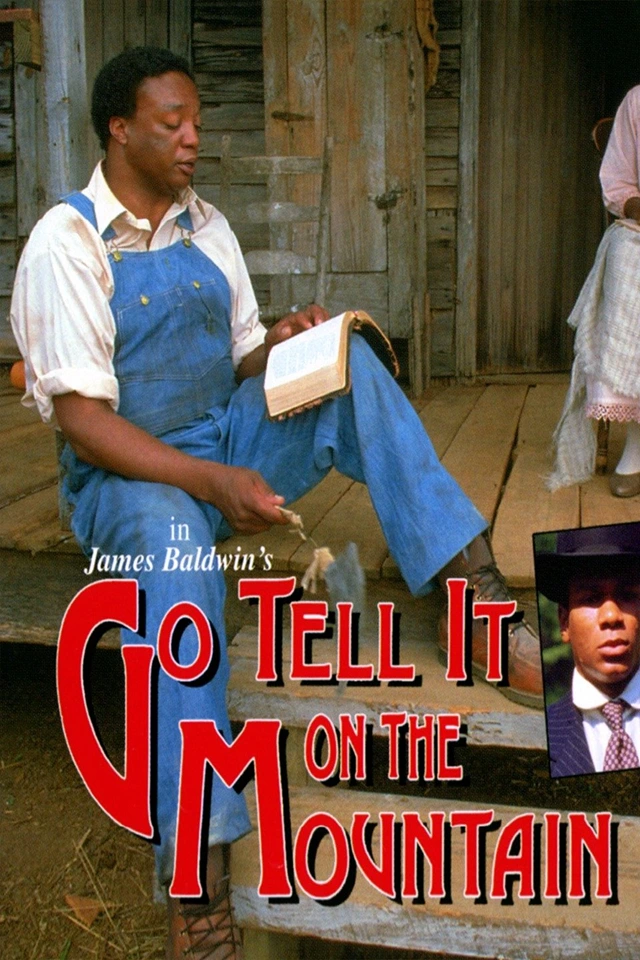 Thanks to the strong cast, Go Tell It on the Mountain is a completely overlooked Southern Gothic
picture of black cinema. That's because of the peculiar nonlinear storytelling as taken from James Baldwin's
semi-autobiographical novel. The themes are richly complex. It's difficult to beat the performances by Paul
Winfield and Ving Rhames in his first movie role of any kind: just a lot of power.
Thanks to the strong cast, Go Tell It on the Mountain is a completely overlooked Southern Gothic
picture of black cinema. That's because of the peculiar nonlinear storytelling as taken from James Baldwin's
semi-autobiographical novel. The themes are richly complex. It's difficult to beat the performances by Paul
Winfield and Ving Rhames in his first movie role of any kind: just a lot of power.
 Believe it or not, Blue Velvet meets all five elements of the Southern Gothic genre and is as surreal
as it gets. The movie starts off with an everyday town that embodies the spirit of Americana. Within there, it
slowly transitions into a dark, seedy subculture that involves drugs, killing, sadistic methods, and rough
attitudes. Frank Booth is the symbol of it all.
Believe it or not, Blue Velvet meets all five elements of the Southern Gothic genre and is as surreal
as it gets. The movie starts off with an everyday town that embodies the spirit of Americana. Within there, it
slowly transitions into a dark, seedy subculture that involves drugs, killing, sadistic methods, and rough
attitudes. Frank Booth is the symbol of it all.
 Beautifully shot but slow in pace, The Texas Chain Saw Massacre is a true horror picture with a great
knack for sheer depravity and terror. What's conceived as a nightmare, it can be reality somewhere in the
country. When the action starts, it's effective as Leatherface comes alive. The family of cannibals is
certainly crazy.
Beautifully shot but slow in pace, The Texas Chain Saw Massacre is a true horror picture with a great
knack for sheer depravity and terror. What's conceived as a nightmare, it can be reality somewhere in the
country. When the action starts, it's effective as Leatherface comes alive. The family of cannibals is
certainly crazy.